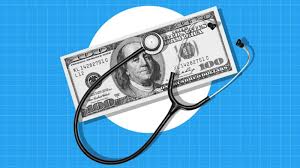Judge nixes a Biden rule in order to keep medical debt on credit reports

Americans’ unpaid medical bills will remain on their credit reports after a federal judge last week vacated a Biden-era Consumer Financial Protection Bureau (CFPB) rule that would have removed such debt.
Judge Sean Jordan of the US District Court of Texas’ Eastern District found that the rule exceeded the bureau’s authority under the Fair Credit Reporting Act, agreeing with the arguments of two industry associations, which had filed a lawsuit against the rule that was later joined by the Trump administration.
The court found that “every major substantive provision of the Medical Debt Rule” exceeded the CFPB’s authority, Jordan, a President Donald Trump appointee, wrote in his opinion.
The rule, which the bureau finalized shortly before the Biden administration left office in January, would have removed an estimated $49 billion in medical bills from the credit reports of about 15 million people. It would have also banned lenders from using certain medical information in loan decisions.
The rule also would have prohibited lenders from using medical devices, such as wheelchairs or prosthetic limbs, as collateral for loans and barred them from repossessing the devices if patients were unable to repay the loans. However, lenders would have been able to continue to consider medical information in certain situations, including when a consumer requests a loan to pay health expenses or asks for a temporary postponement of loan payments for medical reasons.
Those with medical debt on their credit reports could have received a 20-point boost, on average, in their credit score, the bureau said when issuing the rule in January. Also, the rule was expected to lead to the approval of about 22,000 additional mortgages every year.
Medical debt on credit reports is not a good predictor of a person’s ability to pay other loans, the bureau’s research has found. Plus, health care bills often contain mistakes, which can lead to extended battles between patients, health insurers and medical providers.
Republican and industry pushback
Republican lawmakers voiced opposition to the rule soon after it was proposed last August. Several House Republicans wrote to Rohit Chopra, the bureau’s director at the time, to express their “serious concerns” that the proposed rule would “weaken the accuracy and completeness of consumer credit reports.” They argued that it would undermine underwriting processes, increase risk in the financial system and harm access to and the affordability of credit for consumers, particularly lower-income Americans.
The Consumer Data Industry Association, one of the plaintiffs in the case, applauded Jordan’s decision, saying the rule would have meant that “lenders would potentially have had an inaccurate and incomplete picture when making lending decisions.”
“America’s financial system is the best in the world because it is based on a full, fair and accurate credit reporting system,” Dan Smith, the association’s CEO, said in a statement. “Information about unpaid medical debts is an important element in assessing a consumer’s ability to pay. This is the right outcome for protecting the integrity of the system.
The judge affirmed that the CFPB does not have the ability to write law — that is the job of Congress, ACA International, which represents credit and collection professionals, said in a statement.
The association, which had also filed a lawsuit against the bureau’s rule, said the rule would have forced lenders to reduce access to credit and prompted health care providers to require upfront payments.
A group of 30 Democratic and independent senators, however, say the rule would have helped consumers without reducing the accuracy of credit scores. They wrote a letter to Russell Vought, the bureau’s acting director, requesting information about its decision to ask the court to vacate the rule, including any communications with debt collection agencies.
Industry efforts to minimize debt impact
The industry has also taken steps to reduce the impact of medical debt on people’s credit histories.
In 2022, the three largest credit reporting agencies— Equifax, Experian and TransUnion — announced they would remove nearly 70% of medical debt from consumer credit reports.
The agencies no longer include medical debt that went to collections on consumer credit reports once it has been paid off. That eliminated billions of dollars of debt on consumer records.
In addition, unpaid medical debt no longer appears on credit reports for the first year, whereas the previous grace period was six months. That gives people more time to work with their health insurers or providers to address the bills. And medical collection debt of less than $500 is no longer included on credit reports.
Plus, FICO and Vantage Score reduced the degree to which unpaid medical bills impact credit scores.